Sapiens: A Brief History of Humankind (10 Year Anniversary Edition)
£20.89£25.00 (-16%)
A beautiful new hardback anniversary edition of the multi-million copy sensation
INCLUDES A NEW AFTERWORD FROM YUVAL NOAH HARARI
What makes us brilliant? What makes us deadly? What makes us Sapiens?
One of the world’s preeminent historians and thinkers, Yuval Noah Harari challenges everything we know about being human. Earth is 4.5 billion years old. In just a fraction of that time, one species among countless others has conquered it: us.
In this bold and provocative book, Yuval Noah Harari explores who we are, how we got here and where we’re going.
PRAISE FOR SAPIENS:
‘Interesting and provocative… It gives you a sense of how briefly we’ve been on this Earth’ Barack Obama
‘Jaw-dropping from the first word to the last… It may be the best book I’ve ever read’ Chris Evans
‘Startling… It changes the way you look at the world’ Simon Mayo
‘I would recommend Sapiens to anyone who’s interested in the history and future of our species’ Bill Gates
Read more
Additional information
| Publisher | Vintage (11 Jan. 2024) |
|---|---|
| Language | English |
| Hardcover | 512 pages |
| ISBN-10 | 1529913934 |
| ISBN-13 | 978-1529913934 |
| Dimensions | 15.6 x 4 x 24 cm |

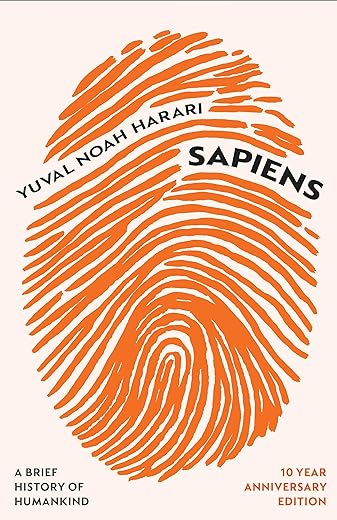
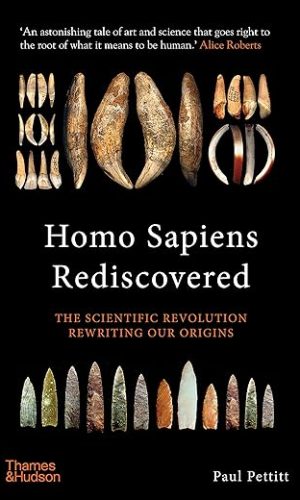
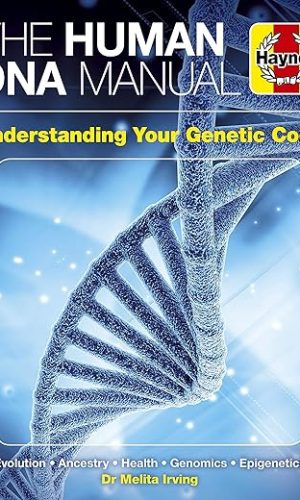

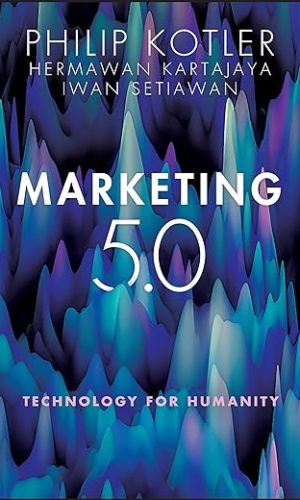
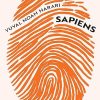
by JMaxfield
After reading this book and then reading many of the reviews below I am astounded that so many reviewers have only used less than 50 words! This book covers hundreds of topics and comments on a vast amount of subjects – so just to say the book was good/excellent doesn’t mean anything – what points did these people appreciate and were there any points you were uncertain about or disagreed with or thought wrong. Believing everything you read is both dangerous and foolish (especially in this day and age) and we should know better e.g. awareness of fake news/information. Although I enjoyed reading the book because of it’s thought provoking questions and analysis of our history as well as the fact that Harari has made the book very accessible through his easy to read style – I did see that his liberal, political correct stance had flaws that should have been obvious to most readers (even if you don’t possess any knowledge in the areas covered by the author). The fact that in the first part of the book Harari refers negatively about scientists and archaeologists speculating on the basis of findings and that they will probably never know if these speculations are true – this is fine – but later on he uses many of his own & other scientists speculations to make his own points. Harari gets us to see through his liberal eyes that if something is biologically possible in nature e.g. a woman can easily do a mans job or gay men can have successful relationships etc then why are some groups of humans opposed to it? This is great argumentation (I am all for equal rights) but push that argument further – that it is biologically possible to have incest, and have sex with under age people and animals – but which of us would openly say that we should consider these aspects of man made restrictions as permissible? (not me for one!). The book also contains factual errors – I will only point out two of those that I noticed to illustrate the point – when an author has chosen to write about an enormous theme such as a History of Humankind – they will inevitably incorporate errors in their research – because they will not check to see if every point they have read about is true or just an assumption by the author/speaker.
Page 247 towards the bottom of the page the author talks about dualistic belief of good e.g. God and bad e.g. Satan/Devil – then the author uses one of his many assumptions (sometimes witty sometimes incorrect) – “How can a monotheist adhere to such a dualistic belief (which by the way, is nowhere to be found in the Old Testament)?”. This is incorrect and he should review the story of Job – wherein God (acting in a very haughty and not considerate way) allows Satan/Devil to prove that if Job didn’t have such blessings (wealth) he wouldn’t be as devote or devote at all to God. So God allows Satan to test Job with only one proviso that he cannot kill him. Satan tests Job by not only taking his wealth, but also killing off his wife, children, servants, slaves, and finally giving him leprosy – the good God allowed this as it didn’t violate the rule and he got to prove his point as Job didn’t renounce God and in return God gave him another lot of wealth, a new wife and kids (not a nice of story about God and his ego).
Page 299 “In 17th Century England, 150 out of every 1000 newborns died during their first year.” This can only ever be a pure guess – many church registers don’t survive for this time and those that do rarely give the age of the person being buried – many entries just give the name and nothing else – and what only serious genealogists and maybe some university professors know is that many Vicars simply didn’t bother entering burial names for infants or did some in a haphazard fashion.
The above points just illustrate we shouldn’t believe everything we read! However saying all of the above I was greatly impressed that the author managed to take on this huge theme and put it into one volume that almost everyone can read and understand. I particularly liked him asking unusually questions such as: why did God punished all the animals, birds etc by drowning them in a flood just because mankind had sinned? Why do many of us when trying to imagine what others thought or felt in the past superimpose ourselves in the other person’s shoes. Are we as individual’s really what we feel e.g. angry or sad or happy? So yes – the book is a great read! excellent! as many reviewers have said in their very succinct way – however, the author does include some incorrect facts and sometimes falls into the same trap that he criticises others of – namely theorising and making assumptions (which everyone does of course). I would definitely recommend it to anyone who wants to know a general liberal view of mankind’s history – although I doubt if many readers will be able to remember many points of the hundreds that he uses if any at all (within a week or two of reading the book). As this is a Brief History of a vast topic – he doesn’t cover anything in-depth – so this will probably suite many of those people from the Pancake Generation (who like their knowledge base to increase in as many subjects as possible but certainly not to any depth thank you very much). I would give the book 8.5 out of 10.
by G Possos
This book is a comprehensive description of human behaviour. It makes clear why we are who we are, it puts you in front of a mirror that shows the true self of us.
by Joseph Augustine
In the spirit of enquiry, Hinari implores the reader right from the off “to question the basic narratives of the world…and not to be afraid of controversial issues”. And true to his word he tackles a host of difficult conversations with the past, present (and future) all achieved with an unmatched economy of style and uncomplicated fluency of writing that has a noticeable liking for exposing contradictions.
The complexity of religion as a system of human norms and values founded on the belief in a superhuman is drilled down down. Take Humanism for example and the variants Liberalism (individualism) and Socialism (equality). Though these are ‘natural law’ religions (or ideologies) built on the belief in a superhuman order they actually have their roots in monotheistic Christianity which focuses on a belief in gods and other ‘supernatural’ entities. However some ‘theistic’ religions with supernatural entities can promote a brand of hierarchical politics, fanaticism and misogyny which many would label ideological, while capitalism-consumerism is wryly suggested to be the first natural law religion in history whose followers do what they are asked of – fulfill their cravings, make money and witness paradise on TV!
Colonialism, a force for good? Plagued by its dark past of “exploring for knowledge through conquering for territory” – and abetted in its exploitation by joint stock investors (with the assistance of imperial governments) – a promotion of scientific discovery and flexible borders led to the establishment of the world’s most foremost and stable form of political organisation still prevalent today.
Intelligent design, is it intelligent? Deselecting natural selection is a race for Frankenstein-like biological engineering firsts, and unfortunately a whole host of ethical issues, none larger than the quest for amortal human life (the Gilgamesh project).
The sections are ordered as a series of dialectical revolutions or Hegelian epochs: agricultural, feudel, scientific, industrial, and as pointer to what the human species is currently enthralled to – an epoch possibly of intelligent design with every epoch having a thesis (revolution) followed by an antithesis (disruption) and then a synthesis (an increase in stability and freedom). For example, the widespread effects of the industrial revolution led to the urbanisation of “intimate communities”, once the preserve of family and community (in tribes, cities and kingdoms). However, what are known as the universal orders of empire, capitalism and religion restablished new patterns of societal maintenance through the “imagined communities” of state and market accompanied by eaches respective inter-subjective realities of nation and consumer tribe.
For me the most interesting aspect of the book is Hinari’s personal insights into prehistory’s mapping of humans as biological and economic shapers of their destiny (as well as plants and animals) in determining “cast iron laws of behaviour” often with tragic consequences. To give a concrete example, the circumstances of the agricultural revolution are humanised with a profiling analysis of a super sleuth in attempting to find an underlying motive: it was a “catastrophe” for the animal kingdom and history’s “biggest fraud” for sapiens as the chance discovery of a luxury food item led to obligations which took on the trappings of a mortgage is the official line here about wheat’s beguilement of humans.
However it is the elaboration of one of these uncomfortable truths – or fundamental flaws – which I think holds the key to the USP of Sapiens. The main theme at the heart of the read is given over to a prehistorical section labelled the ‘cognitive revolution’ based on the intersubjective illusion of the belief that other people also believe in something, usually the same thing which Hinari suggests is the basis for cultural organisation both laterally and verically ultimately leading humans to compare for better or for worse. His proposal is that an advancement in culture has a revolutionary point in prehistory confirmed by the discovery of cultural artefacts through archeology to back this up. In the broader context mighten this be described as the shared imagination’s capacity to reinvent new forms of comparison, and as such isn’t this more likely to be an ageless sapien trait? Inter-subjective reality making as social fact (Durkheim) is part of what we do and doesn’t have to be discovered!
The Irish Playwright, Brian Friel, once famously said “It is not the literal past, the facts of history, that shape us, but images of the past embodied in language”. Reading Hinari’s brief account of history critically reinforces this Saoithe message and for me it is the indulging of this line between fact and fiction, with updated bibliographical references and refreshing historical analyses, which I think would be ripe for a wider audience. A major documentary TV series in the tradition of The Ascent of Man please.